Hi there!
Today I’d like to talk about what you can do before you criticise someone’s apostrophes — and save yourself some grief.
This morning I got several emails via this website, all from the same woman (using an alias) who wanted to let me know that I didn’t have a clue what I was talking about – I was intrigued to read more.
I love getting emails like this because it’s always great to get feedback — good and bad — to see where I can improve my website.

The reader’s first email was quite friendly:
I’m a bit of an apostrophe freak as well – unfortunately (!) – but the thing I find more than strange, is that your very OWN ‘Twitter description’ – is missing an apostrophe!
Here it is: “Teena Hughes loves the humble apostrophe and its friends grammar, punctuation and spelling”
It’s got to be EITHER ‘friend’s grammar’ – or ‘friends’ grammar’ … Depending, of course, on whether you’re referring to one friend, or more .. Just saying! :-) Look forward to looking at your site .. Well done for caring about ‘the humble squiggle’!
I have written back to this delightful lady and thanked her for her emails, but in this case she’s made a mistake — my use of “its” in this sentence doesn’t require an apostrophe because it is not showing ownership nor the omission of a letter. I am merely saying that the apostrophe has friends called grammar, punctuation and spelling.
If I was to rewrite the sentence using names, it would look like this:
- Teena Hughes loves a cat called Spot and its friends Woof, Billy and Deefah.
It’s easier to see the relationship in this sentence, and to understand that no apostrophe is required. If you’re still unsure, please do let me know and I’ll add some explanations.
As I read the remaining emails, I had to raise an eyebrow — or even two, at these comments:
- You ARE kidding! THAT is totally wrong!! Totally!
- How can you be ‘teaching/preaching’ about apostrophes, when you really don’t KNOW how to use them yourself? I’m horrified!
- I’m almost speechless by your lack of knowledge about apostrophes!! You need some HELP!!!
- You are SO wrong! I’m almost speechless by your lack of knowledge about apostrophes!! You need some HELP!!! Your advice is terrible – and incorrect!
I welcome comments from visitors to my site, and healthy discussion is always worthwhile.
As I reviewed each of these statements, I tried to do so with an open mind, because it’s also possible I have made a typing error somewhere — I’m human too, and it’s happened before :-)
I realised very quickly that because this lady is from a different country, she’s assuming that my website absolutely must reflect what she has learned since childhood — in HER country.
Writing back with compassion I explained that each English-speaking country deals with apostrophes, grammar and spelling differently, and it’s not possible to lump them all together and expect them to change their rules to match only one other country.
Where that might be a dream solution or an ideal viewpoint, it’s not really practical and it also takes away the unique nature of language itself.
We are all unique human beings, with vastly varied life experiences and upbringing, sharing the planet the best ways we can, and hopefully by being the best we can be in all situations.
I wanted to write this today just to remind everyone that before you criticise / criticize anyone, please take a step back, do some research and gather a more rounded view of the situation. My email friend has been raised in a different country, and we should both embrace our differences — including apostrophe use, grammar and spelling — as there are many versions of English around the planet.
Quick update: I’ve received a couple of emails (thanks for writing!) about using a dash or colon before the 3 names of the pets. Other emails said colons were very old-fashioned and unnecessary, so there were a few varied opinions. The bottom line is, yes, we can each use whichever punctuation we like or prefer. Thanks again for the emails everyone!
Your Say?
Would you like to share any stories or make a comment about something like this you may have experienced? I’d love to hear from you.
Cheers
Teena
Thanks for reading “Before you criticise someone’s apostrophes”
If you’d like to check out some other apostrophe pages, please visit these below:
